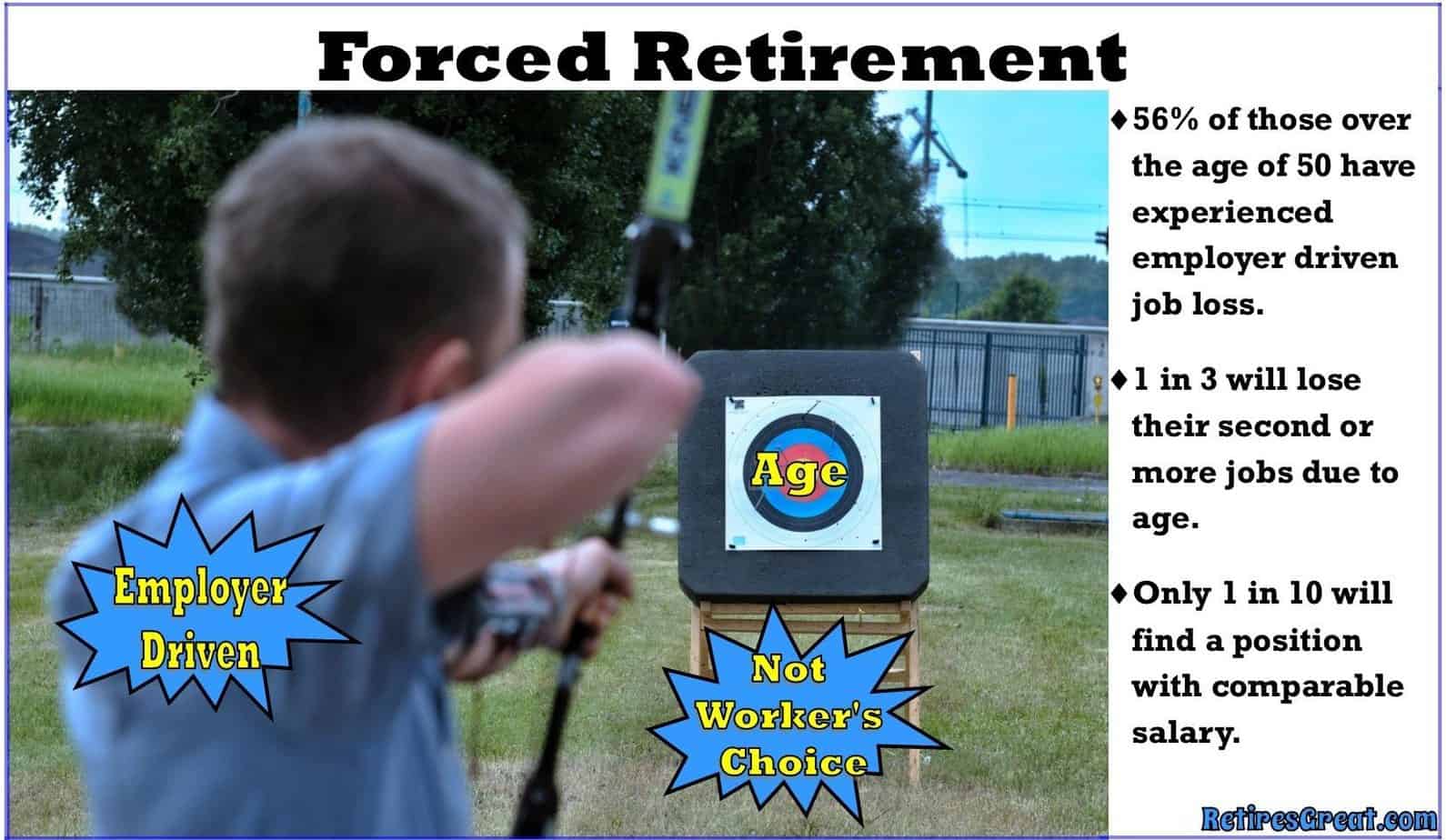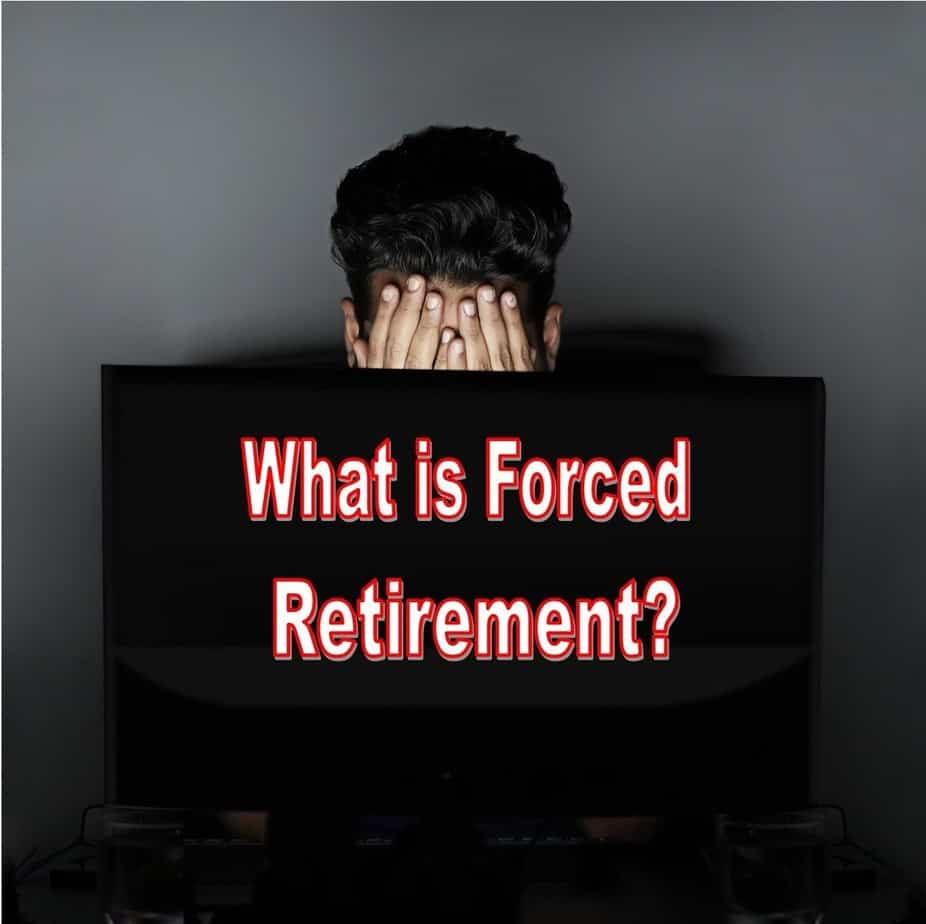"Forced retirement is the term used to describe employer driven job loss forcing older workers to leave earlier (either retire or find another job) than they would otherwise choose. Three conditions must exist, the company wants you gone, leaving is not your preferred choice, and your age is over 40."

What is Forced Retirement?
After considerable research, I realized the confusion about understanding what it really means. The first misconception is that a company can actually force an employee to retire before they are ready. This is completely false!
Actually, the term reflects an employer driven, involuntary job loss for those approaching their planned age to retire.
Typically, this happens between the ages of fifty 50 and 65. Older workers are more likely to be pushed out the door than younger ones.
Mandatory retirement might be thought of as being legislated when the worker doesn’t want their career to end.
However, this only occurs in select occupations where an age has been set, often for safety reasons. Examples include air traffic controllers, airline pilots, law enforcement and firefighters.
For individuals in these occupations, they are well aware of the age limitation of their career and may choose to retire or pursue other opportunities.
For instance, many law enforcement officers migrate into security as a second career.

You may have heard the expression “I was pushed to retire due to health reasons”. Unfortunately, failing health and disease strike many as they age and are approaching their golden years.
Whether it’s themselves or their partner, it may simply no longer be worth continuing to work.
While health related issues are certainly not anyone’s choice, it can be the catalyst to leave. It only becomes involuntary or compulsory when the company decides it’s time to part ways.
Examples:
When Did This Practice Begin?
For all of us baby boomers, our parents and grandparents typically worked for the same organization for many years. Thirty to forty years were commonplace as they steadily contributed to their pensions.
Their crowning achievement occurred on their 65th birthday with a company sponsored celebration. History of Retirement provides greater insights into how it has changed.

Mandatory retirement was abolished in 1986. So, what is forced retirement exactly? At about this time, downsizing became a popular corporate practice as a means to increase profitability and shareholder return.
This was the beginning of cutbacks as we know them today with older workers the ones most frequently dismissed.
Also, this was when employer sponsored pension plans began to shift to employee administrated 401K's.
The Dirty Secrets About Age Discrimination
Age discrimination (ageism) really comes down to biases against the older generation. Discrimination comes in many forms whether it is rooted in gender, race, age, or religion.
The difference, of course, is that it occurs after a certain age. In spite of legislation, ageism is all around us and almost impossible to change because it's based on preconceived notions.
Things That Reinforce Ageism
So how have these attitudes developed? Primarily through social conditioning and experiences throughout life.
Think back to when you were younger, full of ideas, and wanting to get ahead in the organization. For many of us, our way was thwarted by those with more seniority and experience.
That was how it was back then, yet today we recognize that same desire to get ahead with a cruel twist. While we patiently waited our turn, the younger generations have leap frogged ahead of us into management positions. Now, they wield the axes and are intent on pruning dead branches.
We live in an age of consumerism where it's cheaper to buy a new product, such as a television, than repair the old one.
Undoubtedly, there’ll be ones with newer features and a price tag that's the same or even lower. In short, we have become a disposable society.
Younger less experienced workers reduce costs, while older workers command higher salaries. When work can be outsourced, this promotes even greater savings.
The underlying theme has become “out with the old and in with the new”.
The Other Side of the Story
Almost everyone knows of some “almost retired” employee doing as little as possible. They appear to be counting down the days.
In fairness, some of these individuals have dedicated 10, 20, or more years of their life to the company.
Their story might be they feel undervalued, taken for granted, and their career is dead ended. Perhaps they were demoted or passed over for promotion time after time until they finally gave up.
Can you fault them for not feeling motivated and giving their all?

It’s human nature to resist change, especially when everything seems out of your control. Your boss might be only half your age with hardly any experience, yet telling you how to do your job.
Instead of the “tried and true” methods, now corners are being cut or make work projects created.
Under such conditions, various labels can be affixed such as stubborn, unwilling to adapt, difficult to work with, or a host of other demeaning terms.
How to Combat Ageism?
The naked truth is all you have control over is yourself. Having stated the obvious, you have the ability to influence others perceptions of yourself.
Instead of allowing yourself to become tarnished with all those age-related stereotypes, focus on providing immense value to the organization.
Create a “personal brand” where you are the go-to person and the subject matter expert.
To achieve this requires a collaborative spirit and desire to help others. A win-win approach with your boss where your performance is exemplary and you become the de-facto person tackling new projects.
Words of wisdom my father shared with me many years ago were that “when you go to work, work like you mean it”.
Besides working hard, you’ll want to work smart. This approach also opens the doors for advancement and new opportunities.
Keep yourself current by taking courses and attending any conferences you can. Is there an opportunity to do a “Lunch and learn” session to share your knowledge with co-workers?
If you can write and post valuable content (such as on LinkedIn), others within and outside of your organization will recognize your expertise.
Networking becomes a means of job security increasing your marketability within your industry. “Bulletproof your future” provides more guidance on creating your personal brand.
What is the Real Cost?
First and foremost, it’s devastating when you are in your mid 50's and lose your job. Very few people have saved enough to retire and it becomes increasing difficult to find decent employment.
Numerous accounts reveal people with extended job searches taking one to two years. Their savings dwindle, homes are lost, and crushing debt is incurred.
The problem is far more widespread than most of us are aware. ProPublica reports that over half of all older Americans will be pushed out of their job at least once.

Moreover, only one in ten will ever earn as much as they previously had. In addition, it’s estimated that almost half of all potential retirees have no savings at all!
Social security is already straining at the seams with projections that trust funds will be exhausted by 2037.
Rising healthcare costs and increased longevity do not paint a rosy picture for many. Baby Boomer Facts documents the perilous financial outlook we all face.
Is Anything Being Done to Combat Ageism?
Involuntary job loss is a form of age discrimination (also referred to as ageism) which violates federal and state legislation.
This is illegal and charges can be filed with the U.S. Equal Employment Opportunity Commission (EEOC).
However, it can be challenging to prove as it must be clearly shown that age was the primary factor.

Recently the House of Representatives passed the Protecting Older Workers against Discrimination Act as reported by CNBC Markets.
With stronger legislation and growing awareness, there’s hope this trend will decline.
Closing Thoughts on What is Forced Retirement?
There are three factors that determine if you were forced to retire earlier than planned.
These consist of employer intent to remove the employee, the preference of the individual to retain their job, and their age is 40 years or greater.
Combating ageism requires providing such incredible value that the organization cannot afford to lose you. This means becoming a stellar employee doing your job with excellence and expertise.
Rather than being labeled by age, your personal brand becomes one of high competence and team contributions. Career security is further enhanced by networking within your company and the industry.

